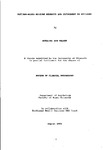PATIENT-RATED SEIZURE SEVERITY AND ADJUSTMENT TO EPILEPSY
| dc.contributor.author | WALKER, ROSALIND ANN | |
| dc.contributor.other | School of Psychology | en_US |
| dc.date.accessioned | 2013-11-13T11:46:38Z | |
| dc.date.available | 2013-11-13T11:46:38Z | |
| dc.date.issued | 1993 | |
| dc.identifier | NOT AVAILABLE | en_US |
| dc.identifier.uri | http://hdl.handle.net/10026.1/2690 | |
| dc.description.abstract |
Studies have indicated that many, although by no means all, people with epilepsy have difficulty in adjusting to the disorder, manifest by higher rates of psychological and social problems than amongst the general population. A variety of neurological and environmental factors have been hypothesized to contribute to these consequences. It has been suggested that the severity of seizures may be an important factor in determining psychological and social well-being, but very little research has investigated this empirically. This study was therefore undertaken to investigate the relationship between patient-rated seizure severity and adjustment to epilepsy. If greater seizure severity was associated with poorer adjustment, measurement of seizure severity might provide a suitable means of identifying those patients who could benefit from a psychoeducational intervention programme, and may also serve as a useful measure of treatment efficacy. In addition, the research considered the value of Wright's (1990) comprehensive conceptual model for the definition and assessment of adjustment, as much research in the area of adjustment to chronic illness has suffered from insufficient definition and difficulties with measurement. The results indicated that seizure severity was only weakly associated with psychological and illness-related measures of adjustment. These associations would not be sufficiently strong to allow the proposed use of seizure severity as an indicator of poor adjustment, although there may be some value in using this variable as a measure of treatment efficacy in addition to seizure frequency. The conceptual model of adjustment was found to be of value as a framework for guiding operationalisation and measurement of adjustment. Results tentatively confirmed the associations currently suggested within the model and further additions were proposed. Suggestions for future research are made. | en_US |
| dc.description.sponsorship | Southmead Health Services NHS Trust | en_US |
| dc.language.iso | en | en_US |
| dc.publisher | University of Plymouth | en_US |
| dc.title | PATIENT-RATED SEIZURE SEVERITY AND ADJUSTMENT TO EPILEPSY | en_US |
| dc.type | Thesis | |
| plymouth.version | Full version | en_US |
| dc.identifier.doi | http://dx.doi.org/10.24382/4627 | |
| dc.identifier.doi | http://dx.doi.org/10.24382/4627 |
Files in this item
This item appears in the following Collection(s)
-
01 Research Theses Main Collection
Research Theses Main


